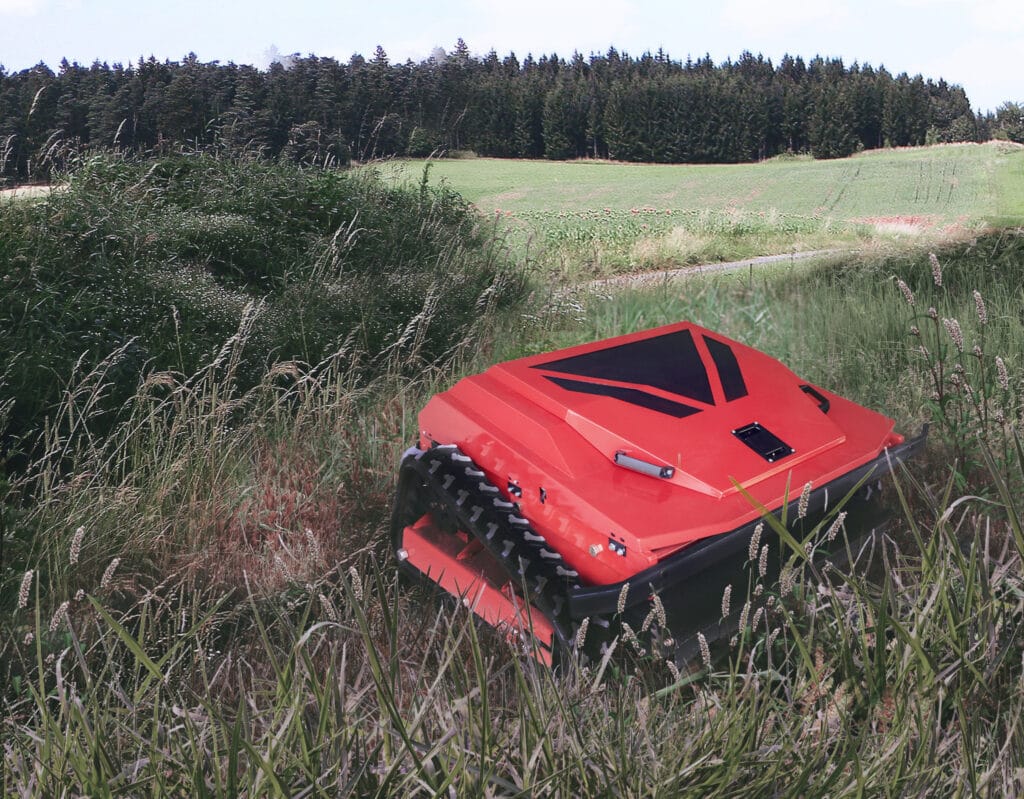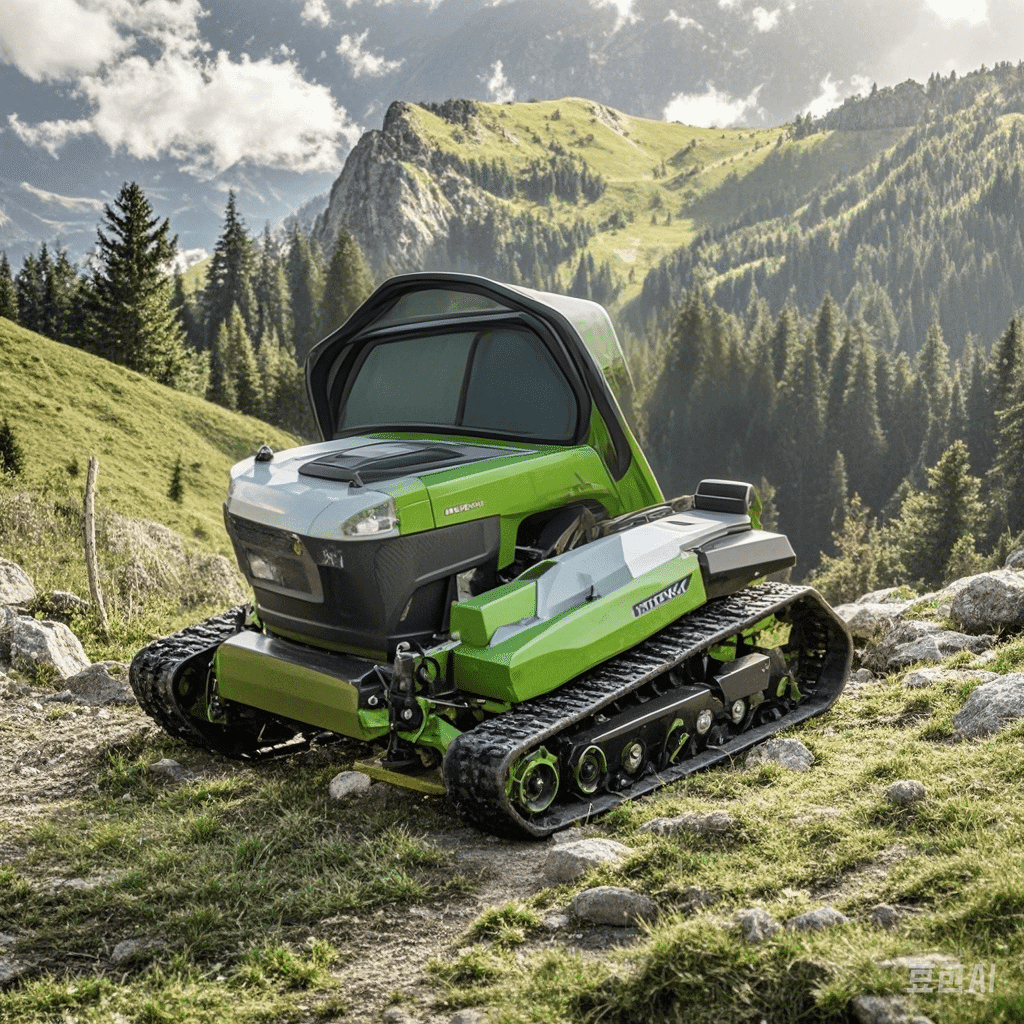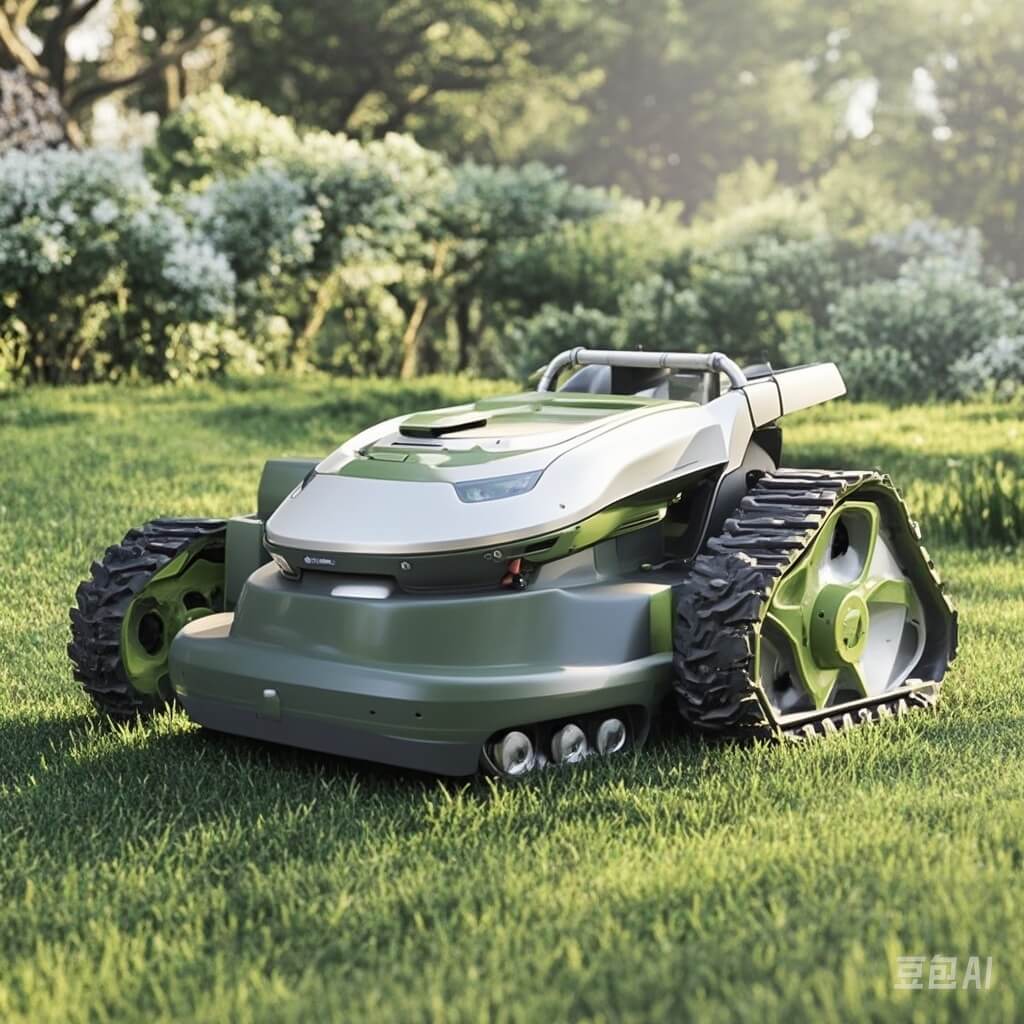No products in the cart.


Remote control lawn mowers represent a significant advancement in lawn care technology, offering a unique and efficient solution for maintaining various types of terrains. Unlike traditional push or ride-on mowers, these innovative devices are designed to be operated remotely, allowing users to control their movement and cutting functions from a safe distance. This capability not only enhances user convenience but also significantly reduces physical exertion, making it an ideal choice for individuals with limited mobility or for those who simply prefer a more hands-off approach to lawn care.
One of the standout features of remote control lawn mowers is their ability to navigate challenging landscapes, particularly steep slopes. Traditional mowers often struggle with uneven terrain and steep inclines, posing risks both to the equipment and the operator. In contrast, remote control mowers are equipped with advanced traction systems and powerful motors, enabling them to maintain stability and performance on slopes that would be otherwise difficult or dangerous to mow. This makes them an invaluable tool for homeowners and professionals tasked with maintaining hilly or irregularly shaped properties.
The growing popularity of remote control lawn mowers can be attributed to their versatility and efficiency. They are increasingly being adopted not only by residential users but also by commercial landscapers and municipal maintenance crews. Whether used for small suburban yards or expansive public parks, these mowers offer a reliable solution for a wide range of mowing needs. The rise in their usage reflects a broader trend towards automation and smart technology in lawn care, emphasizing safety, convenience, and superior performance.
As more people become aware of the benefits of remote control lawn mowers, their prevalence is expected to continue rising. Their ability to seamlessly tackle steep slopes and challenging terrains while minimizing physical effort makes them a compelling choice for anyone looking to achieve a well-manicured lawn with minimal hassle.
Mowing steep slopes presents a variety of challenges that traditional lawn mowers are ill-equipped to handle. The primary concern is the risk of tipping over, which is significantly heightened on uneven or steep terrain. The design of conventional mowers, which is optimized for flat surfaces, does not provide the stability needed when operating on slopes. This instability not only endangers the equipment but also poses a serious safety risk to the operator.
In addition to the risk of tipping, the physical strain on the operator is another significant challenge. Maneuvering a traditional mower on a steep slope requires considerable effort and strength, which can lead to fatigue and even injury. The constant need to push or pull the mower uphill or to stabilize it while moving downhill can be physically exhausting. This physical demand makes mowing steep slopes a daunting task, especially for those who lack the necessary strength or endurance.
Another issue is the inconsistency in cutting results. On steep slopes, maintaining an even cut with a traditional mower is extremely difficult. The uneven terrain can cause the mower to tilt, resulting in an uneven trim. This not only affects the aesthetic appeal of the lawn but can also harm the grass, as inconsistent cutting can lead to patches of overcut or undercut grass, which can damage the lawn’s overall health.
Given these challenges, it is clear that steep slopes require a specialized solution. Remote control lawn mowers, particularly track lawn mowers designed for slope mowing, offer a viable alternative. These modern machines are engineered to handle the complexities of steep terrain, providing stability, reducing physical strain, and ensuring consistent cutting results. With the right equipment, the daunting task of mowing steep slopes can be transformed into a manageable, efficient, and safe process.
Remote control lawn mowers have become increasingly popular for their ability to tackle steep slopes with ease. One of the standout features of these mowers is their low center of gravity. This design element ensures stability and minimizes the risk of tipping over, which is crucial when navigating gradients that can be challenging for traditional mowers. The low center of gravity works in tandem with advanced traction control systems to provide enhanced grip and maneuverability on uneven and inclined surfaces.
Advanced traction control is another pivotal feature that sets remote control lawn mowers apart. These systems often incorporate all-terrain tracks or specialized wheel designs that can adapt to varying ground conditions. Whether dealing with loose soil, wet grass, or rocky patches, the traction control ensures that the mower remains steady and efficient, reducing the likelihood of slippage and ensuring even cutting.
One of the most significant advantages of remote control lawn mowers is their remote operation capabilities. Operators can control the mower from a safe distance, which is particularly beneficial on steep slopes where direct handling would be hazardous. The remote control feature not only enhances safety but also provides a higher level of precision in maneuvering the mower around obstacles and difficult terrain, ensuring a thorough and consistent cut.
Specialized cutting mechanisms are also a hallmark of these innovative mowers. Equipped with adjustable blades and robust motors, remote control lawn mowers can handle the demands of slope mowing effectively. These cutting systems are designed to adapt to the contours of the terrain, providing a uniform cut and preventing scalping or uneven patches. This adaptability ensures that the lawn maintains a well-manicured appearance, regardless of the slope’s steepness.
In summary, the combination of a low center of gravity, advanced traction control, remote operation capabilities, and specialized cutting mechanisms makes remote control lawn mowers an ideal choice for tackling steep slopes efficiently and safely.
One of the primary advantages of using remote control lawn mowers on steep slopes is the significant reduction in the risk of accidents. Traditional manual mowing on inclines can be perilous, with the potential for slips, falls, and machinery rollovers. By employing a remote control lawn mower, operators can safely manage the task from a distance, eliminating the need to navigate hazardous terrain physically. This remote operation substantially mitigates the dangers associated with steep slope mowing.
Another critical safety benefit is the ability to control the mower from a secure location. This not only keeps the operator out of harm’s way but also allows for better maneuverability and precision. Remote control lawn mowers are equipped with advanced features that enable users to steer and adjust the machine effortlessly, even on challenging landscapes. The enhanced control reduces the likelihood of mishaps and ensures a more efficient mowing process.
Moreover, using a remote control lawn mower significantly decreases physical strain and the risk of injury. Manual mowing requires considerable effort, especially on slopes, where balancing and pushing the mower can lead to muscle fatigue and joint stress. Remote-controlled models eliminate this strenuous activity, allowing operators to perform the task without exerting themselves physically. This aspect is particularly beneficial for individuals with health concerns or those who may find manual mowing too demanding.
The design and technology of remote control lawn mowers also contribute to their safety profile. These machines are often equipped with stability features such as low centers of gravity and wide tracks that enhance traction, making them less prone to tipping. Additionally, they often come with emergency stop functions that allow for immediate shutdown in case of unforeseen issues, further ensuring user safety.
In essence, the adoption of remote control lawn mowers for slope mowing offers a safer, more controlled, and less physically taxing alternative to traditional mowing methods. This not only enhances the operator’s safety but also optimizes the efficiency and effectiveness of the mowing process.
Remote control lawn mowers have revolutionized the way we approach slope mowing, offering unparalleled efficiency and performance. When dealing with steep slopes, traditional mowing methods often fall short, struggling to maintain consistent cutting quality. However, remote control lawn mowers excel in these challenging conditions due to their advanced design and capabilities.
One of the standout features of remote control lawn mowers is their ability to deliver a uniform cut, irrespective of the terrain’s incline. This precision ensures that the grass is trimmed evenly, enhancing the overall aesthetic appeal of the landscape. The consistent cutting quality is maintained through sophisticated sensors and automated adjustments that respond to the slope’s gradient, ensuring optimal performance.
Time savings are another significant advantage offered by these innovative mowers. Manual mowing on steep slopes is not only physically demanding but also time-consuming. Remote control lawn mowers, equipped with powerful engines and efficient cutting mechanisms, can cover large areas quickly, drastically reducing the time required for slope mowing. This efficiency is particularly beneficial for commercial landscaping projects or large residential properties, where time and labor costs can be substantial.
Furthermore, remote control lawn mowers are designed to operate in conditions that would typically challenge traditional mowers. Their robust build and advanced traction systems allow them to navigate steep inclines and uneven terrain with ease, without compromising on safety or cutting quality. This capability ensures that even the most challenging landscapes can be maintained effortlessly, providing peace of mind to users.
Incorporating a remote control lawn mower into your landscaping toolkit means embracing a solution that combines cutting-edge technology with practical benefits. The enhanced efficiency and superior performance on steep slopes make these mowers an invaluable asset, ensuring that your lawn remains pristine, regardless of the terrain’s challenges.
Investing in a remote control lawn mower for steep slopes offers significant cost-effectiveness and long-term savings. While the initial purchase price of a remote control or track lawn mower may seem substantial, the long-term financial benefits far outweigh this initial outlay. One of the primary advantages of these innovative mowing solutions is their durability and robustness, reducing the frequency and cost of maintenance. Unlike traditional mowers, which can suffer extensive wear and tear when navigating steep or uneven terrains, remote control lawn mowers are specifically designed to handle such conditions with ease.
Another aspect to consider is the reduction in labor costs. By employing a remote control mower, the need for manual labor significantly decreases, especially in challenging environments where human operation can be risky and time-consuming. This not only saves on labor expenses but also minimizes the potential for workplace injuries, contributing to lower insurance premiums and associated costs.
Additionally, remote control lawn mowers offer superior performance, often resulting in more efficient and effective mowing cycles. This efficiency means that the lawn requires less frequent mowing, translating to further savings. The precision and reliability of these machines ensure that grass is cut at the optimal length, promoting healthier turf that may require less intervention over time.
Moreover, the risk of damage to the mower is notably reduced with a remote control or track lawn mower. Traditional mowers are prone to tipping or mechanical failures when used on steep slopes, leading to costly repairs or replacements. In contrast, remote control mowers are built with stability and safety in mind, ensuring they can operate seamlessly on inclines without compromising functionality.
In conclusion, the initial investment in a remote control lawn mower is justified by the myriad long-term savings it affords. From reduced maintenance and labor costs to less frequent mowing cycles and minimized risk of damage, these advanced mowing solutions offer a cost-effective approach to managing steep slopes efficiently and safely.
Remote control lawn mowers offer a range of environmental benefits that make them an appealing choice for maintaining steep slopes. One of the primary advantages is their reduced fuel consumption compared to traditional mowers. Many remote control mowers are designed with fuel efficiency in mind, which translates to fewer emissions and a smaller carbon footprint. This is particularly important in today’s context of increasing environmental awareness and the need to adopt sustainable practices.
In addition to their environmental benefits, remote control mowers also provide significant ergonomic advantages for the operator. Operating a traditional mower on a steep slope can be physically demanding and potentially hazardous. Remote control lawn mowers eliminate much of the physical exertion required, as the operator can control the mower from a safe distance. This reduces the risk of injury and makes the task of mowing steep slopes far less strenuous.
Another ergonomic benefit is the decreased exposure to noise and vibrations. Traditional mowers can generate substantial noise levels and vibrations, which can lead to operator fatigue and long-term health issues. Remote control mowers, on the other hand, often feature quieter engines and advanced vibration dampening technologies, making them a more comfortable option for extended use. This is particularly advantageous for operators who need to maintain large or multiple steep areas.
Overall, the combination of environmental and ergonomic benefits underscores the value of remote control lawn mowers for slope mowing. By reducing fuel consumption and emissions, these mowers contribute to a more sustainable approach to lawn care. Simultaneously, the reduction in physical exertion and exposure to noise and vibrations enhances operator safety and comfort, making remote control mowers a superior choice for challenging mowing tasks.
Remote control lawn mowers have garnered significant praise from users who have experienced their efficacy in tackling steep slopes. These real-world examples and user testimonials demonstrate the practical benefits and successful implementation of these innovative machines.
One notable case comes from a landscaping company in Colorado that manages several properties with challenging terrains. “We used to spend hours manually mowing steep slopes, which was both risky and inefficient,” says company owner, John D. “Since incorporating remote control lawn mowers into our workflow, we’ve not only improved safety but also dramatically increased productivity. The track lawn mower is especially effective for maintaining traction on inclines, ensuring a smooth and thorough mow every time.”
Another user, Linda H., a homeowner in hilly San Francisco, shares her experience: “Living on a property with steep slopes made lawn care a nightmare. Traditional mowers were simply not up to the task, and hiring professional services was expensive. The remote control lawn mower has been a game-changer for me. It easily handles the slopes and saves me both time and money. Plus, I can operate it from the comfort of my porch.”
Municipalities have also seen the benefits of adopting these cutting-edge mowers. For instance, a city park in Tennessee faced persistent challenges maintaining grassy banks along walking trails. By deploying slope mowing technology with remote control mowers, the park’s maintenance team reported a 50% reduction in labor costs and a significant decrease in worker injuries. “We can now maintain our park’s beauty without compromising safety,” notes the park manager.
These testimonials underline the tangible advantages of remote control lawn mowers across different settings. Whether for commercial landscaping, residential use, or municipal maintenance, these machines offer a practical solution for mowing steep slopes, enhancing both efficiency and safety.




Not only will we redefine our customers’ business models, but we will also redefine the OEM-dealer relationship, in other words, we will always have your back.